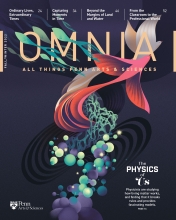The Game of Politics
Alex Tolkin, a joint doctoral student in political science and communication, studies how media coverage that compares politics to sports shapes political attitudes and general worldviews.

“Sports are the last unifying cultural feature in America,” says Alex Tolkin, a joint doctoral student in political science and communication who recently gave a Penn Grad Talk titled “Field of (American) Dreams: Sports and Belief in Competition.”
Given the popularity of sports competitions with American audiences—Super Bowl LVI, which aired on February 13, 2022, drew in nearly 100 million viewers in the United States alone—it’s no wonder that many media companies, especially those reporting on politics, have begun taking programming cues from sports networks. Former CNN president Jeff Zucker even pushed for the cable news channel to take an ESPN-like approach to covering the 2016 U.S. presidential election. But media coverage that analogizes politics to sports can influence people to view not only certain policy areas, but also life in general, as a zero-sum game, Tolkin argues.
Tolkin’s talk is adapted from a paper that examines the causes and effects of seeing the world as a zero-sum game in which one side’s win is equivalent to another side’s loss. While research in psychology suggests that people who feel more threatened tend to view the world in this way, Tolkin examines other factors like media consumption. He argues that another explanation for what causes zero-sum thinking may come from the kind of messaging people receive—not only from the media, but from longstanding cultural narratives. “Many politicians in the U.S. have incorporated sports metaphors into their speeches and concepts like the American Dream are framed in terms of competition,” Tolkin says.
To test his hypothesis, Tolkin first developed a six-item index to measure generalized zero-sum thinking—a relatively new concept without an established scale. He then applied the index to attitudes toward a range of policies, from housing to women’s equality in the workplace. “For the most part, it’s quite strongly correlated with all of them. Across party, whether Democrat or Republican, if you think the world is more zero-sum in general, you also view these various other policies as more zero-sum,” he says, explaining that his findings extend previous research correlating this kind of mindset with a number of policy attitudes.
In the experimental part of his study, Tolkin tested the effect of thinking about competition specifically on zero-sum thinking. He found that participants who were primed to think about sports—through writing about a memorable sports win or loss—before responding to the six-item index saw the world as more zero-sum. While his research is still in the preliminary stages, Tolkin says these initial findings are “significant even if you don’t watch sports.” He explains that, when people are primed to view life as competitive rather than potentially cooperative, consequences may include missed opportunities for cooperation—or worse, rooting against other groups under the misguided belief that their suffering benefits one’s own group.
Tolkin also wonders about the impact on people’s engagement with politics. “If people think about politics a lot, but the vast majority of people don’t hold office, and don’t go to local city council meetings, they never really experience it. What they have experienced instead is this stuff they’re seeing in the media and that they’re trying to make sense of,” he says. Though many people find non-threatening competition, like a televised sports event or political debate that doesn’t directly involve them, interesting or even exciting, Tolkin says, “Some people just don’t like watching competition. Does this change who is interested in politics?”
Tolkin’s study, which he’s presented at the Midwestern Political Science Association, is part of his doctoral research on the factors that shape—and change—political behavior. Another one of his papers, which he co-authored with Diana Mutz, Samuel A. Stouffer Professor of Political Science and Communication, examines how public opinion on the Supreme Court changed after the confirmation of Brett Kavanaugh in 2018.
The existing literature argues that “people have long-term faith in the institution, which is somewhat decoupled from short-term satisfaction with how it’s performing,” Tolkin explains. But in their study, which is currently under review, he and Mutz, also Director of the Institute for the Study of Citizens and Politics, found that Kavanaugh’s confirmation “caused a long-term shift in attitudes towards the Court, but interestingly not a long-term aggregate shift. There was a big divide, so Democrats became less supportive and Republicans became more supportive.”
Mutz and Tolkin’s findings imply the possibility of individual events, especially those that receive massive media coverage, to fundamentally change public opinion on the Supreme Court.
With his research sitting at the intersection of media and politics, Tolkin is currently exploring which directions to take his studies in. “One of the interesting things about the Penn political science and communication program is that it’s a joint program,” he says. “And so I’m technically doing two Ph.D.s in two departments. And the flexibility of that has been really helpful in doing this sort of research.”
To watch Tolkin's Penn Grad Talk, click here.



